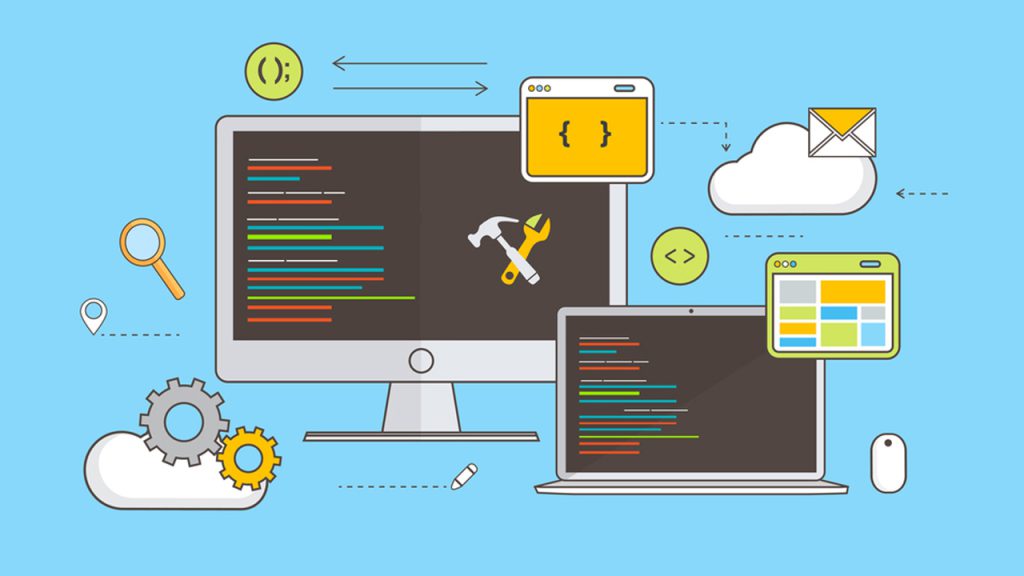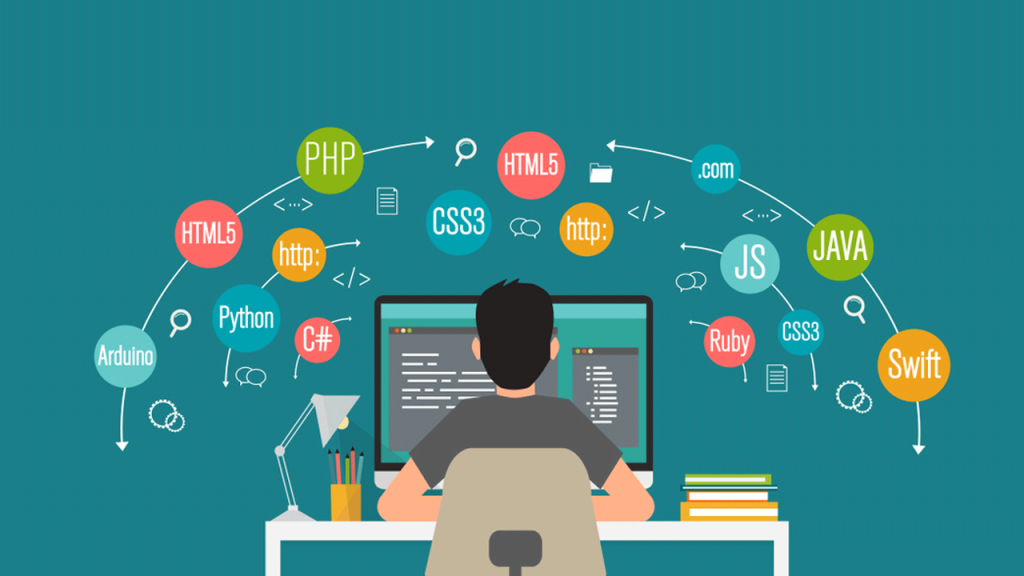At the beginning of programming, you deal with programming languages like PHP, Python, and JavaScript. But it doesn’t take long before you get to know the names of technologies such as Laravel, React, and Symfony, which are called frameworks. In this article, we will explain in simple terms what a framework is, what are the benefits of using a framework, and how using it can make programming a more efficient experience.
What is a framework?
It doesn’t matter if you want to improve an already created application or program an application from scratch; Undoubtedly, you will face a lot of debugging and trial and error during the development process. This is where you will realize that you need to work smarter, not harder.
Developers use frameworks to simplify the process and reduce development time. Frameworks are a set of tools that many programmers and successful programming teams use to create well-structured and reliable software and systems. Frameworks allow developers to be more efficient in developing applications by using an off-the-shelf resource instead of building apps and websites from scratch. These development platforms can include support programs, compilers, libraries, toolkits, and APIs.
Using the framework, even simple websites designed by one person can still have advanced functions such as authentication support, admin and management panels, contact forms, comment section, file upload support, etc. If you want to design a website from scratch, you have to develop all these components yourself. But with a framework, these components are already built in; all you have to do is configure them properly.
What are the benefits of using the framework?
Programmers are good at creative problem-solving and seeing the bigger picture. However, delving into the details of coding is time-consuming and prevents programmers from devoting enough time to more important issues. But thanks to frameworks, developers no longer have to worry about inserting semicolons or building APIs. Using the framework allows programmers to visualize more advanced techniques and focus on finding added value and project development. There are many frameworks, each created for a specific purpose and having its own unique features. However, regardless of their application, frameworks have common advantages that we have explained below:

- By reducing errors and shortening code blocks, frameworks allow developers to spend less time maintaining and testing code. Thanks to frameworks, developers can focus on implementing specific functions in their projects instead of spending time on repetitive tasks such as architecture, security, etc.
- Frameworks provide security to projects and prevent a large number of security flaws. Having a framework that can ensure application security gives developers the opportunity to work with larger clients and more stringent security requirements.
- Frameworks use APIs to communicate easily with any number of web applications, databases, and third-party tools. Therefore, they can be used to increase efficiency.
- Frameworks provide an optimized hierarchical structure for files and folders. Thanks to this separation and classification, the user interface becomes clearer and easier. By following the guidelines of the framework, the code structure is developed coherently, and as a result, its quality is improved.
- Frameworks offer different architectures according to their application. This makes it easier to distribute tasks and develop teams. Additionally, since the architecture of applications developed is the same as a framework when developers join a team working with their frameworks, they can more easily and quickly follow their role on the team.
- Since frameworks are developed by a community of developers and sometimes by private organizations, their maintenance and evolution are more efficient, and updates are more frequent. With a framework, you don’t have to worry about the latest web standards, new compatibility between services, and so on.
- Most frameworks are open source. The open-source nature of the frameworks allows developers to create online communities. So users can work together, post code samples, help others with troubleshooting, and generally help continuously improve each other’s programs.
What are the characteristics of a good framework?
There are many frameworks out there, some more popular than others. Developers often choose frameworks they are more familiar with when that framework may not be the right fit for the project at hand. So when deciding on the right framework, check the following features in the frameworks:
- Performance: Choose a framework that provides the performance you need for your project. Given that every framework has its limitations don’t invest in a framework that is much more than your project needs.
- Integration: Choose a framework that helps coordinate large or distributed teams.
- Documentation: Choose a framework that has good documentation and provides implementation tutorials.
- Active community: The strength of frameworks is as much as the support of their community of users. Choose a framework that is well-established with an active user base.
Types of frameworks

Each framework is created based on a programming language and fulfills a specific need. Therefore, to choose the most suitable framework, you must define your needs precisely and choose the framework that suits your project according to them. In the following, we will introduce various programming frameworks.
Web frameworks
Web frameworks help to develop back-end and front-end web applications. Front-end frameworks, such as Angular or React JS, provide HTML, CSS, and JavaScript templates and components for building the front end of a website or web application. Backend frameworks also support the backend development of websites by providing features such as authentication tools and database management. Backend frameworks are determined by the chosen programming language as well as the target platforms. Laravel, Ruby on Rails, and Django are among the backend frameworks.
Mobile application development frameworks
This category of frameworks supports the development of cross-platform mobile applications or specific applications of a native operating system. There are many frameworks for developing mobile applications, among which React Native, Flutter, and Xamarin can be mentioned.
Content management frameworks
Content Management Systems (CMS) allow users to create, organize, and modify content such as blog posts, e-books, mobile apps, or other online solutions. In addition to price, language, or ease of use, factors such as SEO and security are influential in choosing CMS frameworks. Popular CMS frameworks include WordPress, Drupal, and Joomla.
Data science frameworks
Data science is a vast field that uses statistics, scientific methods in different fields, algorithms, etc., to extract insight from data. Since Python is widely used in the field of data science, the use of data science frameworks, including TensorFlow, PyTorch, Apache Spark, and NumPy, is increasing every day.
What are the challenges of using the framework?
For all the benefits they provide developers, frameworks also have challenges. For example, if developers are not fluent in the language the framework is based on or rely too much on the framework, using the framework will lead to code bloat and performance problems rather than providing any benefit. Therefore, to correctly understand and interpret the basic principles of frameworks and considered technical choices, it is necessary to master the general concepts of internal functions, to understand optimal practices, and of course, to have a detailed knowledge of the framework’s programming language.
Frameworks often impose their choices on us in terms of code architecture. Hence, programmers may face problems accessing language features that are not supported by the framework. Frameworks also impose heavy and complex architecture on simple applications. For example, using a framework to build a static multi-page website complicates the development process rather than simplifying it.
Additionally, there are risks in choosing a framework that is too new or not well supported. Because if the framework becomes obsolete, it will be expensive to replace it with another framework. Similarly, not considering framework limitations can severely impact the development process. Therefore, before using any framework, the project requirements must be defined effectively so that a framework can be selected that fits the actual needs of the project.
The difference between a programming language and a framework

There may be misconceptions about programming frameworks. For example, since frameworks and programming languages are both used in software development, they are often confused. Frameworks are platforms that help you develop software, while programming languages are the foundation of frameworks and the instructions that tell them what to do. All software is developed with programming languages, but there is no need to use frameworks in the development process. Another important difference between programming languages and frameworks is their purpose. A programming language can be used in different areas if each framework is made for only one purpose; Building web apps, mobile apps, or data science.
The difference between a library and a framework
Sometimes the terms “framework” and “library” are used interchangeably. But the “library” is only one of the tools in a “framework.” The framework provides various tools, including libraries, to help you build applications. A library is a collection of low-level components that can be called to achieve a specific result.

When using a library, the programmer directly calls code from the libraries. While frameworks themselves can provide access to libraries and call code. This is a concept known as inversion of control, and it helps reduce bugs, makes testing easier, reduces server usage, and provides a more dynamic programming experience. So although the terms library and framework are sometimes mistakenly used interchangeably, working with a framework is not only much less hassle but also reduces the risk of failure.
Conclusion
Programming frameworks are important tools in the software development process that provide solutions for solving common problems, integrating best programming practices, and using the latest technology options. These development platforms include libraries, APIs, and other elements that make programming faster and more efficient so that developers can focus on creating the elements that make the project unique. Using the right framework can help you market and advance your growth strategy by speeding up development time. In addition, the use of high-quality and pre-checked functions increases the reliability of applications and makes it easy to test applications. As they are continuously improved by the user community, frameworks help improve application security and provide a foundation of support.



